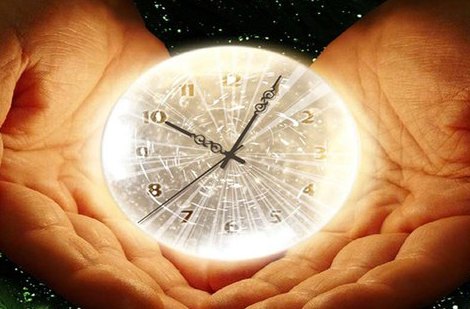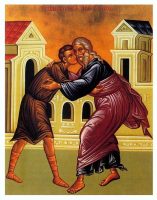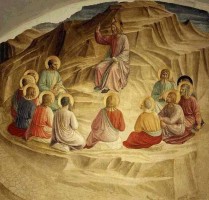(Matt. 25:14-30, pericope 105, 16th Sunday after Pentecost, year is unknown)
Translator’s note: The original appears to be a transcript of a sermon delivered orally, and I have tried to preserve some of its style and punctuation—S.S.
 In the name of the Father, Son, and the Holy Spirit!
In the name of the Father, Son, and the Holy Spirit!
This day is called the beginning of the indiction, the beginning of the church year. For many centuries, a new year in our country began precisely on this day. Later, the New Year was instituted according to the Western style—on January 1. And in many countries, a new year begins differently. In Asia, there is a New Year which is celebrated in late autumn. All of these are human terms, human dates, and our earthly calculations, composed in a way which is convenient to us.
However, these terms, or markers, remind us of what people wanted to mark—whichever year may begin, ecclesiastical or secular, Eastern or Western—people always wanted to mark the impetuous passing of time. And the Sacred Scriptures constantly remind us about the role which time plays in human life.
We are immersed in time like in a rushing river! Time is irreversible; it cannot be turned back. Time cannot be stopped; each fraction of a second it continues to rush forward. Our whole life is immersed in time and depends on time.
Only the Lord is above time, above this stream, in His endless kingdom of light. With God, “a thousand years are like one day, and one day is like a thousand years.” Incidentally for us, a minute and an hour can sometimes last [a long time—S.S.], while years sometimes fly by completely unnoticed. We are slaves of time and cannot free ourselves from it. However, since it is the will of God for us to live in this time, we must remember that it is in time that our whole lives pass and all of our works are accomplished.
It so happened today that the beginning of a new church year fell on the Sunday when the Gospel parable of the talents is read. The parable [is—S.S.] about a master who went away having distributed his money among his servants, and returned expecting that these servants would have increased the wealth.
The mystery of time and this parable are tightly tied together! Indeed, our life must be a constant gain for the Lord; we must accept the time allotted to us as a great and priceless gift. Not one of us knows what measure of life is given to us, or how long we will live. And in the parable, the master comes back suddenly- comes back and settles accounts with people.
And to us our Lord comes suddenly! It does not necessarily have to be death. It can be a moment of testing; it can be a critical and difficult time in our life, when all of our actions and thoughts—everything that we have accomplished—is weighed on the scales. The Lord comes and demands an answer: how did we live our life, and how did we use the time given to us? And here it turns out that we have wasted an infinite amount of it… We were like a wagon or an automobile which is carrying precious cargo [while—S.S.] carelessly spilling it along the way.
Let us recall how much time was spent in idleness, how much [of it—S.S.] was given to unnecessary, useless, and harmful things and tasks; how we did not notice days that passed by, how we did not want to put all our efforts into the vessel of time, in order that in the hour when the Lord comes to settle His accounts with us, we could return to Him increased “talents” and say: “Here, Lord, You loved us, and we, inasmuch as we were able, gave in love to those around us. You gave us abilities, and we labored for those around us. You gave us the law of goodness and truth, and we tried to sow the seeds of this goodness and of this truth in this life.”
And when we begin to feel and understand that time is a treasure which must be preserved rather than wasted, because in a day one can do so many beautiful [things—S.S.], learn so many wonderful [things—S.S.], get filled, enriched from God; or one can live for years aimlessly, colorlessly, sluggishly, monotonously, with an empty, hardened, indifferent heart, and a sluggish and weak will, which cannot move us to do any good deed, which cannot arouse us to fight any of our sins. And we slide along time as a boat that has lost control, like a chip thrown into the water.
Every river eventually flows into a sea. Every life eventually flows into eternity and continues; but time ends there, where there will be the Kingdom of God. In the Sacred Scripture, we read of an angel who swore on the name of the Pre-Eternal that time would no longer exist. This is why we must use all our strength and gifts for the service of the Lord. The service not only through our common prayer, but daily service; because everything that we do for the glory of God—work, and care for others, and prayer, and every deed, every meeting, and rest—all can be before the face of God and for the glory of God.
Thus, as we leave the temple today and go home, let us carry away the thought that time is short, that we must not lose it, that we must increase the treasure in our heart: the understanding of the Sacred Scripture which is given to us, the struggle against the evil and sin which live in us, to multiply kindness, mercy, justice, compassion, and sympathy in our life which the Lord has bequeathed to us. Everything—prayer, labor, life, joy, sorrow—the path of a human life which must pass under the sign of God—all must be before the face of Christ! And then every day, every hour, every moment will be filled with His sacred presence. And there will not be a day, or an hour, or a moment when we would live without God, outside of God, or far from God.
And then our life will be not simply an existence from birth to death, but rather labor, work, building for God, ascent to the mountain of the Lord, where the Heavenly Father awaits us, Who will say to everyone who labored as much as he could: “Good and faithful servant; you have been faithful over a few things; I will make you ruler over many things. Enter into the joy of your Lord.” Amen!



















